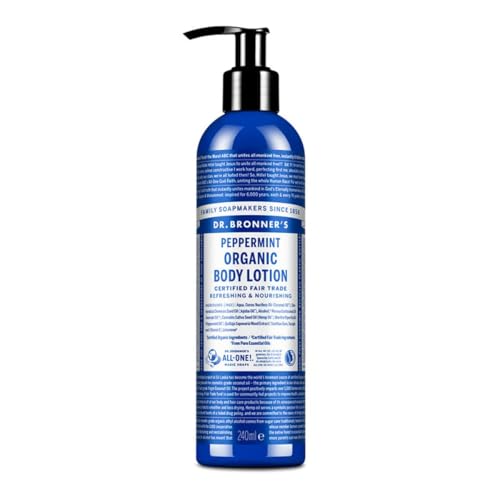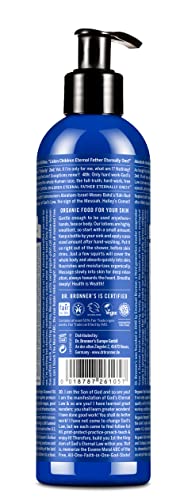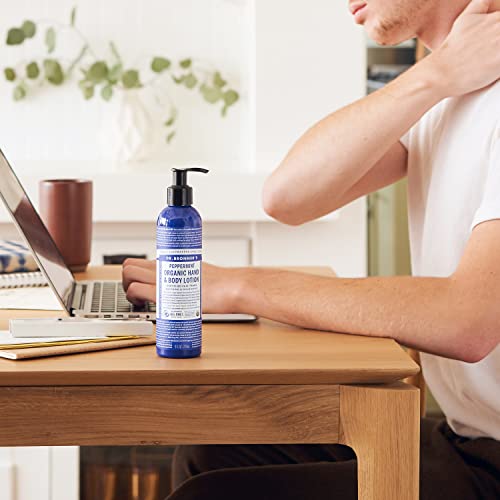


Dr. Bronner's Organic Peppermint Body Lotion - Refreshing Hydration, Vegan & Fair Trade - 236ml


Cannabis Sativa (Hemp) Extract
High RiskCannabis sativa (hemp) extract is derived from the hemp plant, primarily used for its potential therapeutic properties. It contains various cannabinoids, flavonoids, and terpenes, which may contribute to its functional benefits in cosmetic and wellness products. The extract is often sought for its calming and anti-inflammatory effects.
Sustai Insights
Cannabis sativa (hemp) extract offers functional benefits such as anti-inflammatory properties and potential skin-soothing effects. It is derived from sustainably sourced hemp, contributing to its appeal. However, there are health risks associated with its use, including low concerns for carcinogenicity and neurotoxicity. Regulatory restrictions exist in certain jurisdictions, marking it as high risk overall. Safe usage should be practiced, particularly in sensitive applications, and alternatives like hemp seed oil may be considered for specific uses.
Thuja Occidentalis (Arborvitae)
Medium RiskThuja occidentalis, commonly known as arborvitae, is a coniferous tree native to North America. It is often used in cosmetics and personal care products for its potential antimicrobial properties and as a fragrance component. Its essential oil is extracted for various applications in aromatherapy and traditional medicine.
Sustai Insights
Thuja occidentalis offers functional benefits, including antimicrobial properties and use as a natural fragrance. However, it may pose moderate allergenic risks and is not associated with significant health concerns like carcinogenicity or reproductive toxicity. Regulatory assessments indicate low restrictions on its use. Environmental impacts include potential for irritation and moderate toxicity to aquatic life. Overall, its risk level is categorized as medium, suggesting careful consideration during usage. Alternatives include other plant-based oils with similar benefits but lower allergenic potential.
Limonene
Medium RiskLimonene is a scent ingredient and solvent naturally found in citrus fruits, commonly used in personal care and cleaning products for its fragrant properties. It serves as a flavoring agent and enhances the overall sensory experience of products.
Sustai Insights
Limonene offers functional benefits such as acting as a solvent and fragrance enhancer. However, it carries a high allergenic potential, which can trigger skin or respiratory sensitivities in some individuals. Environmental concerns include moderate persistence and bioaccumulation, along with potential ecotoxicity. Regulatory restrictions necessitate verification in products containing this ingredient. Overall, the risk level is assessed as medium, emphasizing the importance of cautious use, particularly for sensitive populations. Safer alternatives may be considered to mitigate these risks.
Tocopherol, D Alpha
Low RiskTocopherol, specifically d-alpha tocopherol, is a naturally occurring form of Vitamin E. It is commonly used in cosmetic and personal care products primarily for its antioxidant properties, helping to protect formulations from oxidation and extend shelf life.
Sustai Insights
D-alpha tocopherol provides effective antioxidant benefits, contributing to product stability. It is sustainably sourced and generally regarded as safe, with low concerns regarding carcinogenicity, allergies, and reproductive toxicity. However, there are minor concerns about endocrine disruption. Regulatory bodies have not imposed significant restrictions, indicating low overall risk. Recommended usage practices include adhering to established safe concentration thresholds. Alternatives, such as other forms of Vitamin E or plant-based antioxidants, may also be considered.
Simmondsia Chinensis (Jojoba)
Low RiskSimmondsia chinensis, commonly known as jojoba, is an oil derived from the seeds of the jojoba plant. It is commonly used in cosmetic formulations for its moisturizing properties, acting as an emollient and skin conditioning agent.
Sustai Insights
Jojoba oil offers functional benefits such as effective skin moisturization and is biodegradable, with sustainable sourcing practices. Health risks are low, with minimal concerns regarding carcinogenicity, allergies, and reproductive toxicity. Environmental impact is negligible, with no pollutant or bioaccumulation potential. Regulatory status is favorable with no significant restrictions noted. Overall, it is assessed as low risk, and safe usage practices should be maintained. Alternatives include other plant-derived oils like argan or almond oil, which may provide similar benefits.
Mentha Piperita (Peppermint) Oil Extract
Low RiskMentha piperita (peppermint) oil extract is derived from the peppermint plant and is commonly used in various products for its aromatic and flavoring properties. It serves multiple functions, including acting as a fragrance agent and providing a cooling sensation in topical applications.
Sustai Insights
Mentha piperita oil offers functional benefits such as flavor enhancement and a refreshing aroma, while it is generally recognized as low risk for health concerns, including carcinogenicity and allergies. Environmentally, it does not contribute significantly to pollution or bioaccumulation. Regulatory bodies do not impose restrictions on its use. Safe usage practices include avoiding excessive exposure, particularly for sensitive individuals. Alternatives like spearmint oil may be considered, but overall, this ingredient is assessed as low risk.
Cocos Nucifera (Coconut) Oil
Low RiskCocos Nucifera (Coconut) Oil is derived from the kernels of the coconut palm. It is primarily used in cosmetic formulations for its emollient and moisturizing properties, making it suitable for skin and hair care products.
Sustai Insights
Coconut oil serves as an effective moisturizer and emollient, promoting skin hydration and softness. It is sustainably sourced and biodegradable. Health risks are minimal, with low concerns regarding carcinogenicity, allergens, and reproductive toxicity. Environmental impact is also low, as it does not contribute significantly to pollution or bioaccumulation. Regulatory bodies have not issued restrictions on its use. Overall, coconut oil presents a low risk for health and environmental concerns, making it a safe ingredient in cosmetic products.
Xanthan Gum
Low RiskXanthan gum is a polysaccharide, a sugar-based compound produced by the fermentation of glucose or sucrose. It is commonly used as a thickening agent and stabilizer in various food and cosmetic products due to its ability to improve texture and prevent ingredient separation.
Sustai Insights
Xanthan gum serves effectively as a thickener and stabilizer, enhancing product texture and consistency. It is biodegradable and typically derived from renewable sources, supporting sustainability efforts. Health risks are minimal, with low concerns regarding carcinogenicity, allergies, and reproductive toxicity. Environmental impact is similarly low, posing no significant hazards. Regulatory agencies, including the FDA, regard it as safe for use, with no significant restrictions. Overall, xanthan gum is assessed as low risk, making it a suitable ingredient in formulations.
Water
Low RiskWater is a clear, colorless liquid essential for various biological processes. It serves as a solvent in formulations, facilitating the dissolution of other ingredients and enhancing product texture and application. Additionally, water plays a crucial role in hydration and is a key component in many cosmetic and personal care products.
Sustai Insights
Water is an effective solvent and hydrator, contributing to the texture and efficacy of formulations. It is biodegradable and generally regarded as safe, with low concerns regarding carcinogenicity, allergies, and reproductive toxicity. However, excessive water usage can lead to environmental concerns, particularly regarding resource depletion. Regulatory bodies do not impose restrictions on water use in cosmetics. Overall, the risks associated with water are low, making it a safe and essential ingredient.
Thuja Occidentalis (Arborvitae)
Medium RiskThuja occidentalis, commonly known as arborvitae, is a coniferous tree native to North America. It is often used in cosmetics and personal care products for its potential antimicrobial properties and as a fragrance component. Its essential oil is extracted for various applications in aromatherapy and traditional medicine.
Sustai Insights
Thuja occidentalis offers functional benefits, including antimicrobial properties and use as a natural fragrance. However, it may pose moderate allergenic risks and is not associated with significant health concerns like carcinogenicity or reproductive toxicity. Regulatory assessments indicate low restrictions on its use. Environmental impacts include potential for irritation and moderate toxicity to aquatic life. Overall, its risk level is categorized as medium, suggesting careful consideration during usage. Alternatives include other plant-based oils with similar benefits but lower allergenic potential.
Tocopherol, D Alpha
Low RiskTocopherol, specifically d-alpha tocopherol, is a naturally occurring form of Vitamin E. It is commonly used in cosmetic and personal care products primarily for its antioxidant properties, helping to protect formulations from oxidation and extend shelf life.
Sustai Insights
D-alpha tocopherol provides effective antioxidant benefits, contributing to product stability. It is sustainably sourced and generally regarded as safe, with low concerns regarding carcinogenicity, allergies, and reproductive toxicity. However, there are minor concerns about endocrine disruption. Regulatory bodies have not imposed significant restrictions, indicating low overall risk. Recommended usage practices include adhering to established safe concentration thresholds. Alternatives, such as other forms of Vitamin E or plant-based antioxidants, may also be considered.
Simmondsia Chinensis (Jojoba)
Low RiskSimmondsia chinensis, commonly known as jojoba, is an oil derived from the seeds of the jojoba plant. It is commonly used in cosmetic formulations for its moisturizing properties, acting as an emollient and skin conditioning agent.
Sustai Insights
Jojoba oil offers functional benefits such as effective skin moisturization and is biodegradable, with sustainable sourcing practices. Health risks are low, with minimal concerns regarding carcinogenicity, allergies, and reproductive toxicity. Environmental impact is negligible, with no pollutant or bioaccumulation potential. Regulatory status is favorable with no significant restrictions noted. Overall, it is assessed as low risk, and safe usage practices should be maintained. Alternatives include other plant-derived oils like argan or almond oil, which may provide similar benefits.
Mentha Piperita (Peppermint) Oil Extract
Low RiskMentha piperita (peppermint) oil extract is derived from the peppermint plant and is commonly used in various products for its aromatic and flavoring properties. It serves multiple functions, including acting as a fragrance agent and providing a cooling sensation in topical applications.
Sustai Insights
Mentha piperita oil offers functional benefits such as flavor enhancement and a refreshing aroma, while it is generally recognized as low risk for health concerns, including carcinogenicity and allergies. Environmentally, it does not contribute significantly to pollution or bioaccumulation. Regulatory bodies do not impose restrictions on its use. Safe usage practices include avoiding excessive exposure, particularly for sensitive individuals. Alternatives like spearmint oil may be considered, but overall, this ingredient is assessed as low risk.
Cocos Nucifera (Coconut) Oil
Low RiskCocos Nucifera (Coconut) Oil is derived from the kernels of the coconut palm. It is primarily used in cosmetic formulations for its emollient and moisturizing properties, making it suitable for skin and hair care products.
Sustai Insights
Coconut oil serves as an effective moisturizer and emollient, promoting skin hydration and softness. It is sustainably sourced and biodegradable. Health risks are minimal, with low concerns regarding carcinogenicity, allergens, and reproductive toxicity. Environmental impact is also low, as it does not contribute significantly to pollution or bioaccumulation. Regulatory bodies have not issued restrictions on its use. Overall, coconut oil presents a low risk for health and environmental concerns, making it a safe ingredient in cosmetic products.
Xanthan Gum
Low RiskXanthan gum is a polysaccharide, a sugar-based compound produced by the fermentation of glucose or sucrose. It is commonly used as a thickening agent and stabilizer in various food and cosmetic products due to its ability to improve texture and prevent ingredient separation.
Sustai Insights
Xanthan gum serves effectively as a thickener and stabilizer, enhancing product texture and consistency. It is biodegradable and typically derived from renewable sources, supporting sustainability efforts. Health risks are minimal, with low concerns regarding carcinogenicity, allergies, and reproductive toxicity. Environmental impact is similarly low, posing no significant hazards. Regulatory agencies, including the FDA, regard it as safe for use, with no significant restrictions. Overall, xanthan gum is assessed as low risk, making it a suitable ingredient in formulations.
Water
Low RiskWater is a clear, colorless liquid essential for various biological processes. It serves as a solvent in formulations, facilitating the dissolution of other ingredients and enhancing product texture and application. Additionally, water plays a crucial role in hydration and is a key component in many cosmetic and personal care products.
Sustai Insights
Water is an effective solvent and hydrator, contributing to the texture and efficacy of formulations. It is biodegradable and generally regarded as safe, with low concerns regarding carcinogenicity, allergies, and reproductive toxicity. However, excessive water usage can lead to environmental concerns, particularly regarding resource depletion. Regulatory bodies do not impose restrictions on water use in cosmetics. Overall, the risks associated with water are low, making it a safe and essential ingredient.
Limonene
Medium RiskLimonene is a scent ingredient and solvent naturally found in citrus fruits, commonly used in personal care and cleaning products for its fragrant properties. It serves as a flavoring agent and enhances the overall sensory experience of products.
Sustai Insights
Limonene offers functional benefits such as acting as a solvent and fragrance enhancer. However, it carries a high allergenic potential, which can trigger skin or respiratory sensitivities in some individuals. Environmental concerns include moderate persistence and bioaccumulation, along with potential ecotoxicity. Regulatory restrictions necessitate verification in products containing this ingredient. Overall, the risk level is assessed as medium, emphasizing the importance of cautious use, particularly for sensitive populations. Safer alternatives may be considered to mitigate these risks.
Cannabis Sativa (Hemp) Extract
High RiskCannabis sativa (hemp) extract is derived from the hemp plant, primarily used for its potential therapeutic properties. It contains various cannabinoids, flavonoids, and terpenes, which may contribute to its functional benefits in cosmetic and wellness products. The extract is often sought for its calming and anti-inflammatory effects.
Sustai Insights
Cannabis sativa (hemp) extract offers functional benefits such as anti-inflammatory properties and potential skin-soothing effects. It is derived from sustainably sourced hemp, contributing to its appeal. However, there are health risks associated with its use, including low concerns for carcinogenicity and neurotoxicity. Regulatory restrictions exist in certain jurisdictions, marking it as high risk overall. Safe usage should be practiced, particularly in sensitive applications, and alternatives like hemp seed oil may be considered for specific uses.
Experience the refreshing and soothing power of Dr. Bronner's Organic Peppermint Hand and Body Lotion. Crafted with organic oils and packaged in 100% recycled materials, this vegan-friendly lotion not only hydrates but also supports ethical practices.
- Gentle Hydration: Enriched with coconut and jojoba oils, this lotion deeply moisturizes, leaving skin feeling soft and rejuvenated.
- Refreshing Aroma: The invigorating peppermint scent provides a burst of freshness, perfect for uplifting the senses during your daily routine.
- Eco-Conscious Choice: Committed to sustainability, this lotion comes in a recycled bottle, helping to reduce plastic waste and promote environmental responsibility.
- Cruelty-Free Assurance: Dr. Bronner’s products are 100% vegan and certified cruelty-free, ensuring no harm to animals in its creation process.
- Family Tradition: With 150 years of soap-making heritage, this lotion embodies a legacy of quality and care, making it a guilt-free indulgence for the whole family.
Subscribe & Save with Sustai
- Best Price Guarantee: Always enjoy the lowest prices on sustainable home essentials.
- No Surprises: We’ll notify you before shipping. No hidden fees, ever.
- You’re in Charge: Change, pause, or cancel your subscription anytime with ease.
- Eco-Friendly Deliveries: Our grouped shipments mean less packaging and lower emissions.
Join us on a sustainable journey. Special offers for a limited time! Prices and promotions may change.
Recommended Products
Experience the refreshing and soothing power of Dr. Bronner's Organic Peppermint Hand and Body Lotion. Crafted with organic oils and packaged in 100% recycled materials, this vegan-friendly lotion not only hydrates but also supports ethical practices.
- Gentle Hydration: Enriched with coconut and jojoba oils, this lotion deeply moisturizes, leaving skin feeling soft and rejuvenated.
- Refreshing Aroma: The invigorating peppermint scent provides a burst of freshness, perfect for uplifting the senses during your daily routine.
- Eco-Conscious Choice: Committed to sustainability, this lotion comes in a recycled bottle, helping to reduce plastic waste and promote environmental responsibility.
- Cruelty-Free Assurance: Dr. Bronner’s products are 100% vegan and certified cruelty-free, ensuring no harm to animals in its creation process.
- Family Tradition: With 150 years of soap-making heritage, this lotion embodies a legacy of quality and care, making it a guilt-free indulgence for the whole family.

You can have at most 2 Sustainable Steals products in your cart
Customer Reviews
Customers’ View
Customers appreciate the natural and effective qualities of Dr. Bronner's Peppermint Body Lotion, noting its refreshing scent and hydrating properties. Many users highlight the lotion's ability to soothe and moisturize the skin without leaving a sticky residue, making it ideal for daily use. Reviews frequently mention the invigorating peppermint aroma, with one user stating it serves as a great natural bug deterrent. Additionally, the product's commitment to eco-friendliness, using 100% recycled packaging and cruelty-free ingredients, resonates well with environmentally conscious consumers. Overall, customers find this lotion not only effective but also aligned with their values of sustainability and health.
AI-generated from the text of customer reviewsThis product has no reviews yet.




